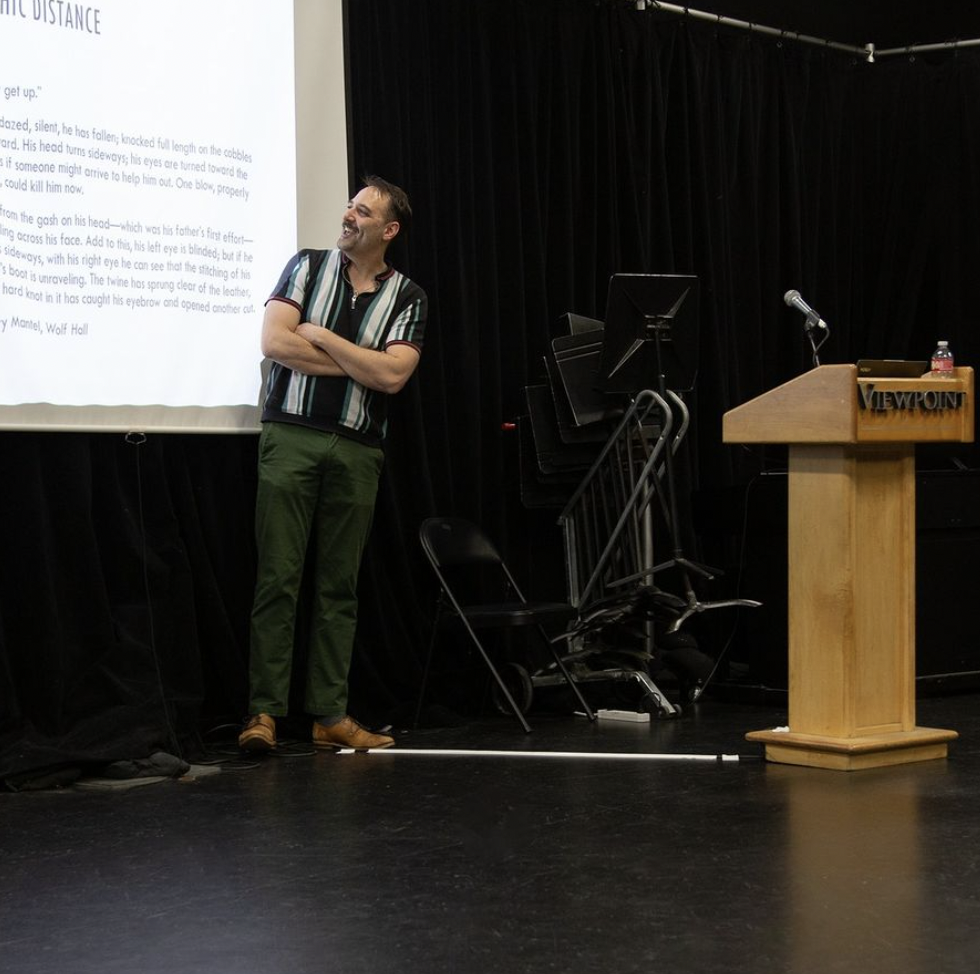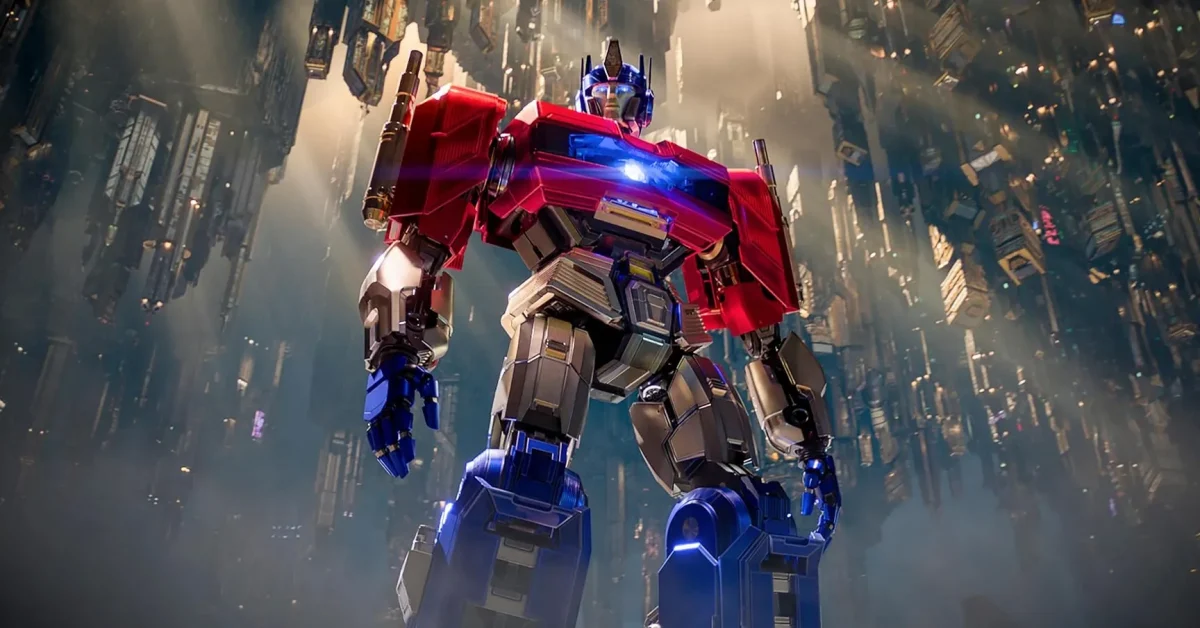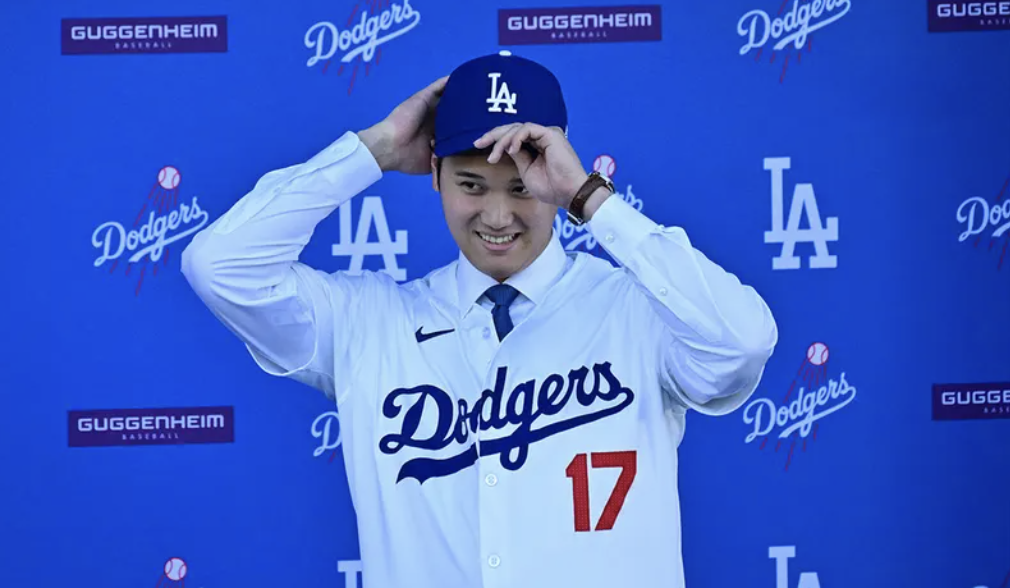For Ted McCombs (‘00), the bustling halls of Viewpoint look quite different from when he last passed through them. “It was a very California school,” the author and climate lawyer reflected on his campus memories. “We didn’t have a lot of facilities…I remember taking Algebra 2 in a trailer classroom.” Despite the many changes, there were plenty of familiar buildings and faces to welcome him throughout his day on campus.
The Alum returned to Viewpoint on November 8th for a talk sponsored by the Upper School’s Literary Scholars program. His lesson on “Narrative” ranged from exploring perspective through the eyes of Katniss Everdeen to the difference between narrator and character, all techniques vital to telling a story.
Afterward, the Patriot team spoke to Mr. McCombs about his memories at Viewpoint, his new book, Uranians: Stories, and his advice for young writers. This interview can be found below, with some questions and responses abridged for clarity and length:
The Patriot: What was Viewpoint like back in 2000? What was it like being a student?
Mr. McCombs: I loved being a student here. I think the quality of education that I got here was incredible. It also really helped that it was a small class size. My graduating class was 55. I don’t know if that’s comparable to what it is now.
The Patriot: It’s around 110 for our senior class this year.
Mr. McCombs: Okay. So yeah, twice as much. But that really made it so that the high school experience was not what I had been led to dread. There were no cliques that were like the jocks versus the nerds. It was “everybody knew everybody else.” I was in the chess club, but also on the football team. Everything was very fluid to move through these different social groups. As a person who was in the closet during high school, that actually made it a lot easier for me to imagine myself differently and come out a couple of years after graduation. But it was just a really warm environment. This idea that everything’s in this really pretty big building with all the equipment is…it’s funny to me. I’m trying to think of what else is going back to that time. I just remembered how much I liked my teachers and my other classmates who love sports, but I liked my coaches also.
The Patriot: So many teachers stay here at Viewpoint for a long time. I know people who’ve been here for 40 years, so theoretically, they’ve been here when you’re here. Have you seen any people whom you recognize?
Mr. McCombs: Yeah! So I just came from lunch with Mr. Azhar, who was my calculus teacher. And apparently, Ms. Dority is still here. She was my AP Euro teacher, and she also taught a course that I loved called Technologies of Power. And it was a science fiction course, and I write science fiction now. And so it was a very influential class. We read Brave New World. We read Pastwatch, I think. Yeah. A lot of books that have stayed with me. We have a lot of teachers who stayed here for a while, so it’s nice to see that we have a really strong alumni network, too. So it’s nice that people are able to come back and be like, “oh, yeah, I took this class”. And then people are like, “oh, yeah, I’m taking that class, and it’s the same test.” I’m still in touch with people from my graduating class. I was just in Denver, and I saw one of my best friends from high school. So we’re still all in the network.
The Patriot: A lot of people want to be authors. “Author” is right up there, with “magician” or “astronaut” for what you want to be as a kid. But what inspired you to really get going?
Mr. McCombs: I was writing stories when I was in high school. I was writing in middle school even, and I never treated it as anything more than a hobby. But I guess it was in my 20’s when I started to really take it seriously. What I meant by taking it more seriously was that I needed to give more to it. It wasn’t just about the time to write and whether the writing was good. It was, “I’m going to start taking classes.” “I’m going to start reading books specifically about writing”. “I’m going to do workshops”. I didn’t go to grad school for writing like some of my fellow writers have, but it’s just a matter of when you give more to it, you get more out of it. I think you’re right, 99% of people who want to be writers don’t end up getting to publication. But I think the ones who do are the ones who stuck with it, who could take a lot of rejection, take a lot of disappointment, and still found enough that they enjoyed the experience to keep going with it. The first book that I got my agent with didn’t end up selling, and it was a huge disappointment. But there was something about the experience of creating a fictional world, of investing in these characters and seeing through their eyes and exploring the world, that it was just so much fun that I couldn’t imagine just stopping. I kept writing, and I kept trying to become a better writer and tried to publish, and eventually, it got through.
The Patriot: It’s so difficult to get yourself started because it’s such a rejection-heavy career. How did you motivate yourself to keep going?
Mr. McCombs: It’s by focusing on the work. The rejection and the acceptance start to become something more neutral. It’s not about how many people like me, how many people buy my book, or whether a publisher rejects me or not. The fact that it’s rejected doesn’t make the story any worse. The fact that it was published doesn’t make the story any better. What matters is the quality of the story. As long as I have done my utmost to bring that story to life and to do it well, then I’ve succeeded by my own terms. If someone else wants to take it and run with it, that’s their choice.
The Patriot: So it’s not personal.
Mr. McCombs: Exactly. It’s not the source of my sense of validation. It’s not what makes me feel successful. Success is something I define for myself.
The Patriot: How do you get yourself to write? What does a typical day of writing look like?
Mr. McCombs: Yeah. I wake up early to write because I have a 9-5 job. I’m a lawyer, and that takes up a lot of mental energy. By the end of the day, I’m just shot. I have to wake up early because (laughs) my partner does not wake up early on his own. I usually give myself about an hour or two, and that’s about it, so I write very slowly and I write long-hand. I find working on physical paper with an actual pen is a lot more successful. I write better with it than trying to stare at a blank screen and type on it. And usually, if I’ve already figured out what project I’m working on, then a lot of it is just trying to imagine the scenes…maybe do a little bit of doodling to get a sense of where the characters are in space. Usually, I’ll have some lines that I thought of the night before as I was falling asleep. But then, if I’m really far along, it’s all revisions I’ll print out work and mark up by hand. And that’s always really fun for me, when you’re like sunk in the line, and you’re trying to make the line or the sentence better, I can just lose myself. Then I look up and it’s already time to go to work.
The Patriot: It’s so easy to be very digital and to let it stay on the screen, but doodling does get those ideas flowing for you.
Mr. McCombs: Yeah. One of my teachers is a cartoonist, and she had us do exercises to just get the creative juices flowing like “draw yourself as a vegetable” or “draw yourself as a cowboy”. And just the act of imagining differently gets you sort of into a creative zone where everything flows a lot easier. That was her idea.
The Patriot: Do you still use some of those exercises?
Mr. McCombs: I do. I don’t have any with me, but I have some pretty funny doodles in my drawer.
The Patriot: Looking at your book, Uranians, I’m struck by the art on the cover. Can you tell me about it?
Mr. McCombs: So that is from the ceiling of a church in Rome. I can’t remember which it is, but the image of this is called a “trompe l’œil”, which means “a trick of the eye”. And if you can imagine standing in a church looking up at this, it looks like you’re looking up into actual clouds and seeing that. That’s sort of the idea, that there’s a three-dimensional quality to it that draws you in. And that’s an image that’s from the first story, of this idea of, like, a false paradise that looks real, that looks like you could actually get some promise of heaven to get into.
The Patriot: Uranians consists of five stories. Can you briefly describe the premise of the overall story?
Mr. McCombs: So the first one is “Toward a Theory of Alternative Lifestyles.” This one asks a really fraught question from a very anxious place of “what does it mean to be queer”? What does it mean to be different from the majority, from the mainstream? Does that obligate us to be sort of “radicals” who are fighting the mainstream at every turn? Or what about the people who are kind of square, who just want to have something like a normal life? Is that legitimate? Is that even possible? And so it follows this very neurotic character who’s wrestling with these questions, but the twist of that story is that he’s going to this club in Germany, this nightclub or techno club, where the music actually lets you see alternate realities and see yourself in an alternate universe.
The second story is called “Lacuna Heights”. It’s a fun, memory-technology story, kind of like Severance or Eternal Sunshine of the Spotless Mind.
The third one, the novella, is “Uranians”. This is a story about a long-haul spaceship that’s going from Earth to another planet. And it’s got this expedition of scientists and artists and thinkers who are just there to sort of explore and see what’s on this other planet. But, because of the nature of the expedition, that doesn’t want there to be any children on board, a lot of the people who end up signing up end up being queer artists, queer thinkers.
“Six Hangings in the Land of Unkillable Women” is a fantasy story where women have developed an invincibility. They can’t be killed, and things are different, but they’re not necessarily much better for the women. And it examines misogyny. It examines violence against women, and also really strange things, like capital punishment.
“Talk to Your Children about Two-Tongued Jeremy” is my evil chatbot story, which I actually wrote long before ChatGPT was in the news. Yeah, Talk to Your Children” was 2017. So was “Six Hangings” and “Lacuna Heights”. So most of these were written five years ago.
The Patriot: This feels very much like Black Mirror, if you’ve seen that.
Mr. McCombs: Yeah. It’s so like, looking back, you would believe this was written, like, last month. It’s so predictive. And I think writing stories like this in this genre, there’s always going to be this long-lasting element, especially with the theme of being an outsider. I think that’s just so interesting because I was reading “Talk to Your Children”, and I was like, wow, this is so relevant.
The Patriot: Speaking of “Talk to Your Children”, you use a lot of cool narrative to illuminate, not just the AI, but the institutional failures that enable it. We can see when companies are protecting each other from human backlash. Do you think when you wrote this that this is going to happen to us, where institutions are going to protect each other from backlash over AI?
Mr. McCombs: Yeah, it happens all the time. In all […] cases so far, the company has always been like, “Well, they’re not supposed to use it that way”. I think one of the things that I’m most troubled by with AI is we’re getting a worse product and putting people who could give us a better product out of work. So like an AI artist or an artist who could create, say, the title sequence to the next Disney+ show, but instead they use an AI-generated animation, we get a worse piece of art, and the person who could have given us a better one is out of work. I think that is the more social cost of AI that the companies are like, “Oh, that’s not on us at all”.
The Patriot: Do you think that there’s potential for AI to have positive impacts in non-creative fields?
Mr. McCombs: I think there’s a lot of great opportunities. I know that there are some uses of AI that are absolutely incredible. Even in creative fields. I’m reading a book right now called Do You Remember Being Born by Shawn Michaels, and it’s about a poet who writes, who collaborates, with an AI chatbot on a poem. The book is itself a collaboration with a chatbot. There are places where you see the AI suggest a line or a stanza, and it’s a great piece of art. Even in the creative field, there are ways I think you can use AI or integrate these large language models in ways that are really generative and additive, not substitutive. I think that’s the negative, is when we get into talking about replacing people with machines. Nobody wants to get a machine instead of a human as an artist. But collaboration or using AI as a tool to create even weirder or more stuff? That I think could be promising.
The Patriot: It’s about balance, not letting it escalate.
Mr. McCombs: Yeah.
The Patriot: Speaking of balance, you’re a lawyer and an author. What is your advice to stay balanced?
Mr. McCombs: Healthy perspective. Know what you want to do and make time to do it. I think I love my legal job. When you let go of certain definitions of success, or what it means to be good at your job or good at life, then you get the freedom to choose your own path and achieve something more like balance. I know that I’m not going to be at the very top of my field because I would have to give more than I want to give to reach that. But I still look at my career as very successful. I’m doing the work that I want to do that I care about, and I’m doing it well, and that for me is success.
The Patriot: Many young writers, looking forward, are looking at AI as something threatening. What is your advice to young writers who are worried or skeptical about AI?
Mr. McCombs: If you don’t want to engage with AI, don’t do it. Just stay away and keep writing and concentrate on your own work. The chips will fall where they fall. I think if you’re curious or if you’re enthusiastic about using AI as a tool, that’s fine. Just don’t let it become a crutch. Just allow yourself to be curious. But at the end of the day, you’re the writer, you’re responsible for everything. Don’t lose sight of that responsibility.
The Patriot: What other upcoming projects can you tease for us?
Mr. McCombs: I just published a story in the Washington Square Review last month. It’s called “Alien Vs. Bachelorette”. It’s a fun alien invasion story told through the Bachelorette TV series.
The Patriot: Your titles are so good.
Mr. McCombs: Thank you, thank you. I’m proud of that one. Then I’ve got a second book that I’m on contract for with Aster House, who published Uranians. I don’t have a title for that one yet, but it’s taking a story that was almost in the collection about an alternate medieval world where something like a Catholic Church controls all mathematics. That’s going to be expanded into a novel.
The Patriot: And where can we find Uranians?
Mr. McCombs: Any place where books are sold, or online if you want to do bookshop.org; that one will support indie bookstores who are in need of your dollars.
The Patriot: Anything else you’d like to add?
Mr. McCombs: Touch on, no. Go Patriots!
The Patriot: We’re still the Patriots after all this time!
Mr. McCombs: (laughs) Yes, that’s nice.
This interview was conducted on November 8th, 2023, and has been edited.






